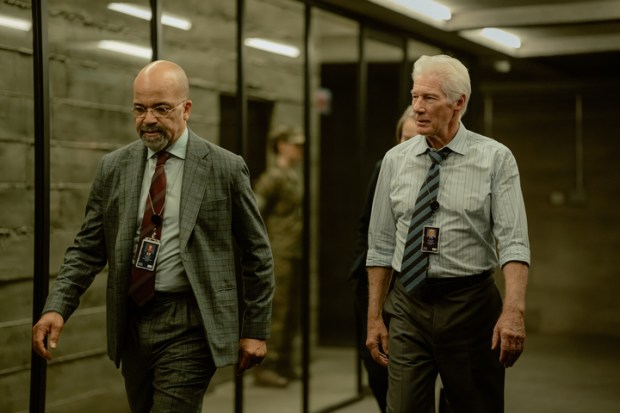In the espionage thriller “The Agency,” Michael Fassbender plays a CIA case officer working deep undercover when he’s abruptly exfiltrated and called back to London Station. No one is telling him why. And his re-acclimation process has its own complications. A gorgeously shot meditation on the psychological toll of obscuring one’s identity, the series also stars Richard Gere and Jeffrey Wright as men higher up in the chain of command, and Jodie Turner-Smith as the lover he left behind who mysteriously — coincidentally? — shows up in London not long after his return.
Fassbenger’s character is called Martian. Is that his real name or a wry code name hinting at the alien reality of this existence? The CIA has put him in a stylish high-rise apartment that offers a view of the perpetually gray skyline. But before he settles in, he puts a record on the turntable and begins studiously examining his new digs for listening devices. It’s a wordless and elegantly tense sequence. At one point, the camera frames a tight shot of Martian’s eyeball as he stares through a shelving unit. Even back home he’s being watched — and followed wherever he goes — by the very government that employs him. It’s for his own good, he’s told. Standard protocol in the first few months after a case officer returns. That proves to be an inconvenience for Martian, who’s hiding some secrets, including his reunion with that lover he met under his previous identity. Is she really who she says she is? Turner-Smith gives the kind of refined and cagey performance that suggests the answer could go either way.
Has Martian been played or is he just paranoid? What does it mean to constantly side-eye everyone around you? A psychologist (Harriet Sansom Harris) has been summoned to the office to see how he’s coping, but he resists her efforts at every turn.
Created by brothers Jez Butterworth and John-Henry Butterworth, the show (streaming on Paramount+) is based on the French series “The Bureau.” Only four of the season’s 10 episodes were made available to critics, so this comes with a heavy caveat — a story can start out well enough and then struggle to live up to its ambitions — but I like what I’ve seen so far, with its world of operatives and handlers, of covert glances and back-channel subterfuge, laid out with a seductive urgency that gives a deceptively graceful quality to all this unseemly work. Can the show maintain this quietly tasteful propulsion over 10 episodes?
Martian is opaque by necessity and also perhaps by personal inclination — he is methodical and robotic and deeply uninteresting — but Fassbender never allows us to see behind the mask, which makes Martian a somewhat inert character amid the high-stakes work at hand. There’s a potential catastrophe in Belarus, where a CIA operative is arrested for driving drunk. Will he blow his cover? That sets in motion plotting and strategizing from Martian and his bosses, played by Gere (unflappable, pinched, corporate) and Wright (the smartest guy in the room who is trying to keep Martian from self-destructing). They calmly watch a video of an interrogation in which a man is tortured, trying to determine if he’s a double agent. He’s nothing more than a specimen they’re observing. It’s all so emotionless and sick. This is a far less heroic vision of the CIA than that portrayed in the jingoistic “Jack Ryan,” but it’s not exactly a critical one, either.
There’s another mission they’re worried about that’s of “utmost sensitivity — the capture of these operatives would constitute an immediate strategic geopolitical disaster.” That Gere delivers this line with a straight face is nothing short of remarkable. What these covert operatives are trying to accomplish is kept vague, which is probably the right storytelling choice; it suggests whatever they’re doing has value (rather than the opposite, which seems more likely).
Martian’s outlook and motives are just as hazy. When he slips his tail for a sexual rendezvous, Wright’s character finds him anyway and he’s unstinting in his reprimand. People come back damaged after being deployed undercover for so long he says. “Can’t sleep. Flashbacks. Some go absolutely raving lunatic insane. Therefore we have protocols — for instance, we follow you.”
“This isn’t national security, it’s personal,” Martian says.
“It’s the agency, nothing is personal,” he’s told.
Everyone is hiding something. Nothing remains hidden for long. That dissonance is underscored by a number of compelling cinematic choices in the first episode. The U.S. embassy, where they are based, is filled with glass-walled offices where so much is obscured, despite the apparent transparency. But it all comes out in the end.
“The Agency” — 3 stars (out of 4)
Where to watch: Paramount+
Nina Metz is a Tribune critic.




